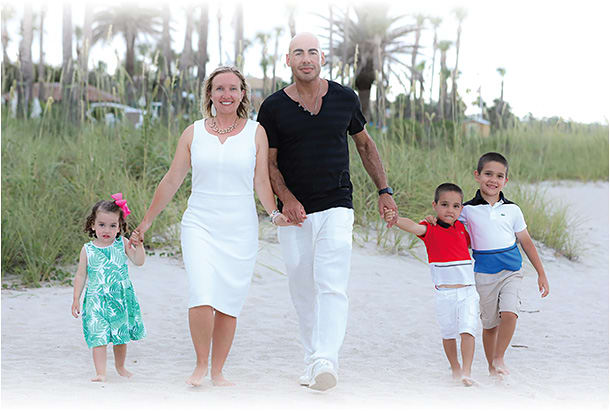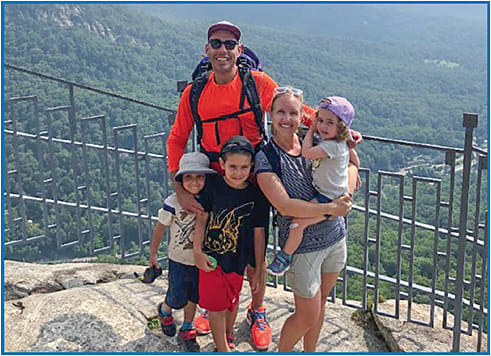
As a new retinal specialist, you’ve probably led a rather nomadic existence during the last few years, moving from med school to residency and fellowship, and then on to your first job. You’ve likely made some difficult choices along the way, perhaps leaving your extended family and your hometown in pursuit of your career goals. I’ve been there.
Although I was born in Lisbon, Portugal, I grew up in Canada. I attended medical school and completed an ophthalmology residency at Queen’s University, Kingston, Ontario. Fully embracing the nomadic existence, I earned a PhD in pharmacology at the University of Szeged in Hungary and an MBA in Healthcare Management at George Washington University in Washington, DC. Then, my wife, who is also from Canada, and I moved to the United States, so I could complete my retina fellowship at the University of Iowa. We had a wonderful 2 years in Iowa City, and found we really liked the Midwest.
Immediately after fellowship, we moved to Minnesota, where I joined VitreoRetinal Surgery in the Minneapolis-St. Paul area. Again, it was a wonderful experience, but as our family grew — we now have 3 children, the oldest just starting kindergarten — we felt the tug of family ties and geography. As much as we enjoyed Minnesota, we thought it would be nice to live in a warmer climate closer to our extended families, most of whom live along the east coast of Canada.
This realization led us to North Carolina, where I now work as a vitreoretinal specialist at Metrolina Eye Associates, an expanding multispecialty practice based in Charlotte. The decision to move wasn’t made lightly and involved months of research and planning. Here, I share some of the key factors we considered, including some that are easily overlooked.
WHY MOVE?
Right now, there’s a certain element of mobility in retina practice, as we try to optimize the relationship of geography, family, and work environment. How you prioritize these factors depends on where you are in your career and your life.
Right out of fellowship, we’re most familiar with the academic world and may be eager to explore new opportunities, but regardless of whether we stay in academia or go into private practice, we start to learn what it’s like to be a retina specialist in the real world.
At the same time, we may now be part of a couple and possibly have young children. Our personal and professional priorities and goals undergo rapid changes, which is why I think many of us have so much movement in the first 5 years of practice.
The overarching reason why I relocated my practice and moved 1,000 miles with my wife and children was, in a word, family, and I think that’s usually the most important factor when any physician moves to a new location. The good news is that the job market for retina specialists is quite robust. With the aging of the baby boomers and the associated increase in age-related eye diseases, the demand for our services is high. The American Society of Retina Specialists and the American Academy of Ophthalmology post new retina jobs every day, and they’re all over the country.
Accepting a position after fellowship may be something of an “Aha!” moment — you like the practice, you like the doctors, it seems like a great opportunity — but any subsequent move will need to be more thoroughly researched because so many more factors are in play.
First, you’ll need to decide on a practice setting. Do you want to work at a university or in private practice, and if the latter, would you prefer a retina-only group or a multispecialty practice? This is a key decision to make before deciding to relocate.
Once you and your spouse or partner are sure a move will be good for your family and career, your search will likely begin with location.
5 Key Logistical Issues
Moving your family to a new home and settling into a new job is a massive undertaking with many diverse components. In thinking about geography, type of practice, city, and so on, it’s easy to overlook some important logistical matters. These five issues should be included on your transition checklist:
1. CONTRACT
In addition to carefully reviewing the proposed employment contract yourself, I recommend having it reviewed by a lawyer. Ask questions, negotiate, do your due diligence. You’ve been in practice for a few years and have gained some insights. You now know the “real retina world,” so tap into that knowledge to ensure you’re happy with the contract and practice circumstances.
2. UNEMPLOYMENT PERIOD
How much time are you comfortable being unemployed between jobs? You’ll want to minimize uncertainty and your exposure to an extended unemployment period, but plan on a minimum of 1 month; moreover, items, such as licensing, credentialing, getting on insurance plans, and so on, can easily take 3 to 6 months, so you need to start early. If you’ve accepted a new position while you’re still employed, you may be able to start this process before relocating.
In any case, consider taking some time off before you start your new job. I finished my fellowship training on June 30, then drove from Iowa City to Minneapolis, and started my new job on July 1. Looking back, that probably wasn’t the best idea. This time around, I took a month off to spend time with my family. While you’re balancing the needs of two practices to make sure everyone’s happy in terms of end and start dates, be sure to find time for your personal life and your family.
3. RETIREMENT BENEFITS
You’ve been working and contributing to a 401(k) plan as well as other investment vehicles, and if you’re lucky, your employer’s been contributing, too. When you join a new practice, there will more than likely be a waiting period before you can start contributing again — 6 to 12 months is typical — so try to max out your 401(k) before you move. This is a simple technical issue that’s easy to overlook.
4. HEALTH INSURANCE
During the time you’re unemployed, you’ll also be without health insurance. But, you may qualify for COBRA coverage, which allows you to continue your employer-sponsored health plan for a limited time.
If you choose COBRA coverage, be aware that you will be responsible for paying 100% of the premiums — including the share your employer used to pay — plus a small administrative fee. Jokingly, I told my family that none of us could get sick, because COBRA is too expensive. Seriously, though, if you have medical issues that need to be addressed or if a family member needs regular care, whether or not you take COBRA is an important decision.
5. MALPRACTICE TAIL INSURANCE
When you leave a practice, you’re still legally responsible for all of the patients who were under your care. Tail insurance covers the period after you’ve left the practice while those patients still need care. Again, this is an issue that will impact your finances. Will your previous employer pay for this coverage? Will you need to pay for it? Are you sharing that cost? Depending on how this will be handled, that could be a large sum, and it may affect how much time you want to take off between jobs.
WHERE TO GO?
Narrowing your search for a new location involves some serious introspection. Do you want to live in the Midwest or the East or West Coast? What about north versus south? Do you want to settle in an urban center, a medium-size city, a small town, or a rural area? Is proximity to an airport important to you?
Keep in mind that some cities are already saturated with retina specialists, while others may have a greater demand for services. And all states are not created equally when it comes to malpractice insurance, taxation, and tort reform. You’ll need to research all of these factors to ascertain an optimal location.
My wife and I focused our research on the southeastern United States. We examined everything from proximity to our extended families, schools for the kids, and, of course, job opportunities for me. If your partner or significant other will also be searching for a job, that adds another layer of complexity to this already frenetic process.
Charlotte ticked off all the right boxes for us, including a wonderful opportunity with a multispecialty group where I could see a strong future. It took us a long time, and it was a tough decision to leave a place we like, but we feel we planned well for this move.
There are many other factors to consider when deciding whether — and where — to relocate. (See “5 Key Logistical Issues” on page 17 for a checklist of key considerations.)
OPTIMIZE YOUR PRACTICE SETUP
You’ve gained some important insights thus far in your career as you’ve adapted to various clinics and ORs. Now, you can have some input into how you’d like to practice: how much clinic time you want; how much OR time you want; what your role will be in research or administration.
Be proactive about these details. You may have found the right city, the right practice, the right everything — but how you envision your Monday through Friday and your weekends may be totally different from the needs of the practice.
Also, consider what your transition period will look like, day to day. Do you need to change equipment? Will you need to meet all of the referring doctors in the area? Are there referring doctors in your new practice?
This will be a somewhat tumultuous time, and you’ll be eager to hit the ground running, but be sure to take the time to think things through. As you carve out your role as a key team member, your new employer will appreciate that you have a clear plan to deliver excellent patient care, because at the end of the day, that’s what it’s really all about.
A Family Decision
I can’t stress enough the importance of good honest communication and dialogue with your spouse or partner during this process. You’re changing everything in everyone’s lives — your home, your kids’ schools, where you shop, everything — and he or she must be an active participant in this decision.
Your partner should travel with you to all of your interviews and serve as your second set of eyes and ears. No question is too trivial. For example, will you be required to travel to distant satellite offices regularly, which means you may not be home to tuck in the kids most nights? It’s not only your workplace that’s changing but also your and your family’s lifestyle.
Once your decision is made, be sure to accentuate the positive aspects of this move, so the entire family is looking forward to an exciting new adventure.

GO WITH CONFIDENCE
For most of us, research is part of our DNA. Once you’ve done your due diligence and investigated everything you know to investigate, remember that you have the training and the skill set to be successful. Finding the right fit may come down to asking yourself, “Will we be happy here?”
As for my family, I like to say we’re undergoing a smooth transition. We’re hoping to make Charlotte our home for a long time, and my parents, who still live in Canada, think this area could be a wonderful place for them to retire. I think we took the right steps, did the right research, and made the right move. NRP









